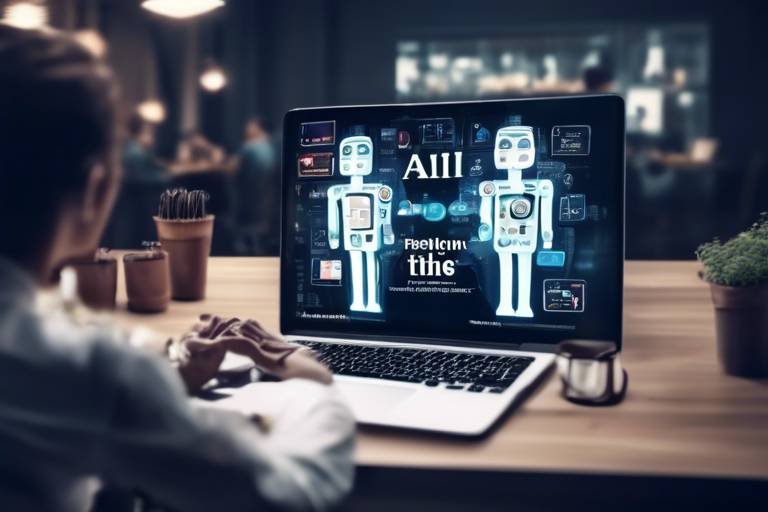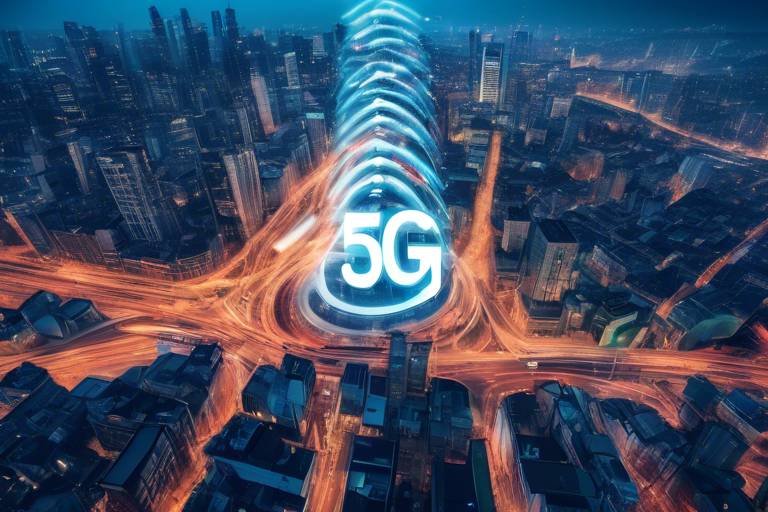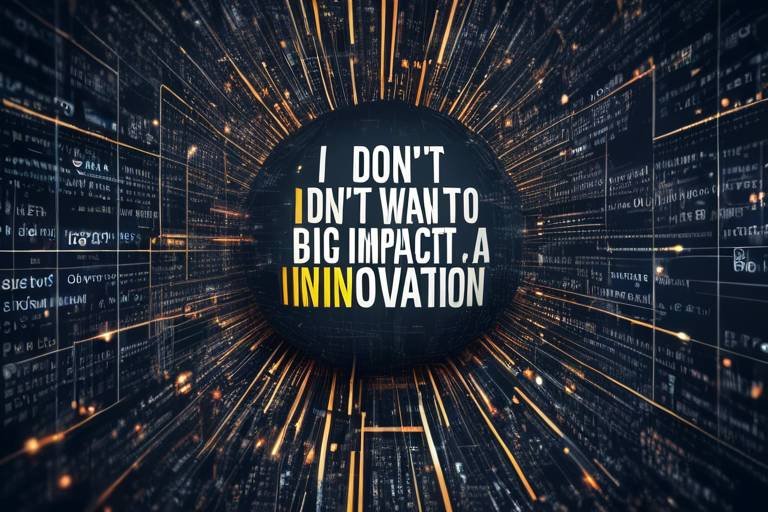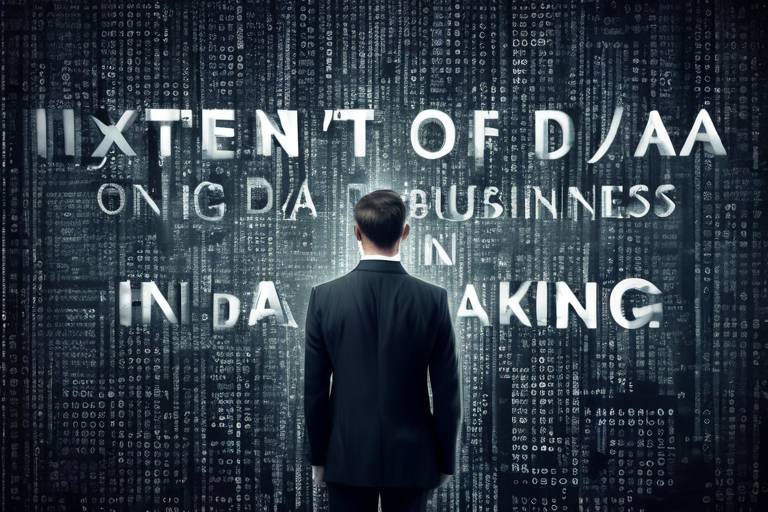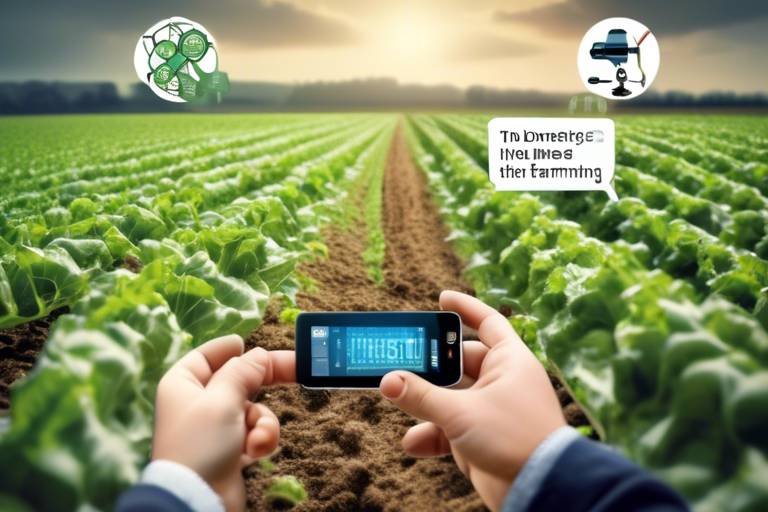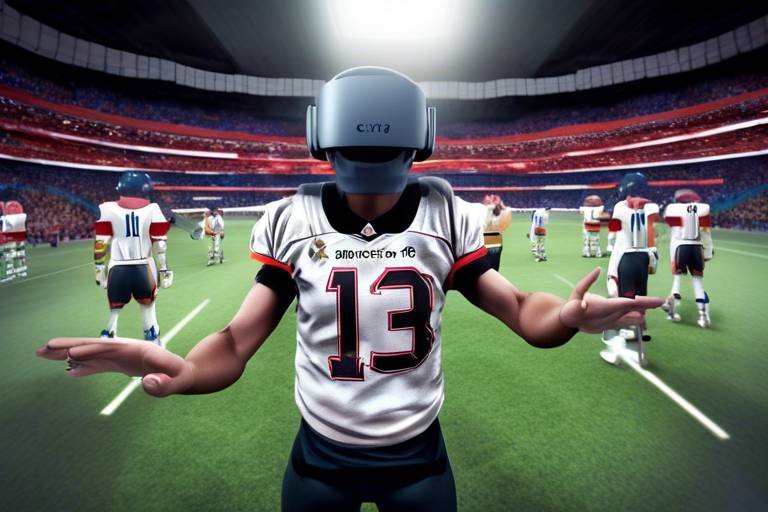How AI is Revolutionizing Marketing?
Artificial Intelligence (AI) is not just a buzzword; it’s a transformative force reshaping the marketing landscape in ways we never thought possible. Imagine a world where your marketing strategies are not just based on gut feelings but are backed by data-driven insights and predictive analytics. This is the new reality for businesses that are embracing AI technologies. From enhancing customer engagement to optimizing marketing campaigns, AI is revolutionizing how companies connect with their audiences.
Consider this: every time you browse online, AI is working behind the scenes, analyzing your behavior, preferences, and past interactions to tailor experiences just for you. It’s like having a personal shopping assistant who knows exactly what you want before you even say it! This level of personalization is not just a luxury; it’s becoming an expectation. Consumers today are looking for brands that understand their needs and cater to them individually. With AI, marketers can deliver highly personalized content and recommendations, which significantly boosts customer satisfaction and engagement rates.
But how did we get here? The rise of AI in marketing can be traced back to the increasing availability of data. Businesses are now able to collect vast amounts of information about their customers, and AI's ability to analyze this data is nothing short of revolutionary. By leveraging AI tools, marketers can gain actionable insights that lead to more informed decision-making and targeted campaigns. Whether it’s understanding customer behavior or predicting future trends, AI is paving the way for a more efficient and effective marketing approach.
As we delve deeper into this topic, it’s essential to highlight some key trends that are emerging from this AI revolution. For instance, predictive analytics powered by AI helps businesses anticipate consumer behavior, allowing for proactive marketing strategies that can drive sales. This means that instead of reacting to what customers want, businesses can predict and fulfill those needs before they even arise. Isn’t that incredible?
Moreover, AI enhances customer segmentation by identifying distinct groups based on behavior and preferences. This enables tailored marketing approaches for each segment, ensuring that the right message reaches the right person at the right time. It’s like having a finely tuned marketing machine that adapts to each customer’s unique journey.
Another exciting aspect of AI in marketing is automation. AI-driven tools streamline various marketing processes, improving efficiency and allowing marketers to focus on strategic initiatives rather than getting bogged down by repetitive tasks. Imagine freeing up hours of your time to brainstorm creative ideas instead of spending it on mundane data entry. That’s the power of AI!
Looking ahead, the future of AI in marketing is bright. As technology continues to evolve, we can expect even more innovative solutions that will further enhance marketing strategies. The possibilities are endless, and for marketers willing to embrace these changes, the rewards can be monumental. However, with great power comes great responsibility, and it’s crucial for marketers to navigate this new landscape thoughtfully.
- What is AI in marketing? AI in marketing refers to the use of artificial intelligence technologies to analyze data, automate processes, and enhance customer engagement.
- How does AI improve customer personalization? AI analyzes customer data to deliver tailored content and recommendations, improving the overall customer experience.
- What are predictive analytics? Predictive analytics uses AI to forecast future consumer behavior based on historical data, helping businesses make informed marketing decisions.
- Can AI create content? Yes, AI can generate high-quality written and visual content, saving time and resources for marketers.
- What does the future hold for AI in marketing? The future will likely see more advanced AI applications, offering new opportunities for personalization and efficiency in marketing strategies.

The Rise of AI in Marketing
In recent years, the marketing landscape has undergone a seismic shift, and at the core of this transformation is artificial intelligence (AI). This technology has emerged as a true game-changer, enabling businesses to not only optimize their strategies but also enhance the overall customer experience. Imagine walking into a store where every product recommendation feels tailor-made just for you—that’s the magic of AI in action!
AI's rise in marketing can be attributed to several key factors. First and foremost, the sheer volume of data generated by consumers today is staggering. With billions of interactions happening every second across various platforms, the challenge for marketers is to sift through this information and extract meaningful insights. AI excels in this area, using advanced algorithms to analyze vast datasets far more efficiently than any human could. This capability allows marketers to identify trends, understand consumer behavior, and make data-driven decisions that resonate with their target audience.
Moreover, the integration of AI into marketing strategies is not just about crunching numbers; it’s about creating personalized experiences. For instance, think about how Netflix recommends shows based on what you’ve watched before. This level of personalization is made possible through machine learning algorithms that analyze user preferences and behaviors. Similarly, businesses can leverage AI to tailor their marketing messages, ensuring they reach the right audience at the right time with content that truly speaks to them.
As we delve deeper into the rise of AI in marketing, it's essential to recognize the pivotal role of automation. Automation tools powered by AI are streamlining various marketing processes, from email campaigns to social media scheduling. This not only saves time but also allows marketers to focus on more strategic initiatives, enhancing overall productivity. For example, AI-driven platforms can automatically segment audiences, optimize ad placements, and even predict which campaigns are likely to succeed, all while minimizing human error.
To illustrate the impact of AI in marketing, consider the following table that highlights some of the key benefits:
| Benefit | Description |
|---|---|
| Enhanced Customer Insights | AI analyzes consumer data to uncover patterns and preferences. |
| Improved Personalization | Delivers targeted content and recommendations to users. |
| Increased Efficiency | Automates repetitive tasks, freeing up time for strategic work. |
| Predictive Analytics | Forecasts future trends based on historical data. |
In conclusion, the rise of AI in marketing is not just a trend; it's a revolution that is reshaping how businesses interact with consumers. By harnessing the power of AI, marketers can create more personalized, efficient, and data-driven strategies that ultimately lead to greater customer satisfaction and loyalty. As we continue to explore the various facets of AI in marketing, it’s clear that this technology will play a crucial role in the future of the industry.
- What is AI in marketing? AI in marketing refers to the use of artificial intelligence technologies to analyze data, automate processes, and enhance customer interactions.
- How does AI improve personalization? AI analyzes consumer behavior and preferences to tailor marketing messages and recommendations, making them more relevant to individual users.
- What are predictive analytics? Predictive analytics uses historical data and AI algorithms to forecast future consumer behavior and trends, helping businesses make informed marketing decisions.
- Can AI automate marketing tasks? Yes, AI can automate various marketing tasks such as email campaigns, social media posting, and audience segmentation, allowing marketers to focus on strategy.

Personalization Through AI
In today's fast-paced digital world, personalization has become a key factor in capturing customer attention and driving engagement. With the rise of artificial intelligence (AI), businesses are no longer sending out generic messages to their audiences. Instead, they are leveraging AI technologies to deliver highly personalized content that resonates with individual preferences and behaviors. Imagine walking into a store where every product is tailored just for you; that’s the kind of experience AI is bringing to the online marketing landscape.
AI algorithms analyze user data from various sources, including browsing history, purchase patterns, and social media interactions. This data is then used to create a detailed profile for each customer, allowing marketers to craft messages that speak directly to their interests. For example, if a customer frequently browses outdoor gear, AI can highlight relevant products in their emails or ads, making the marketing efforts feel less like a sales pitch and more like a helpful suggestion from a friend.
Furthermore, the power of AI in personalization extends beyond just product recommendations. It encompasses a wide range of marketing strategies, including:
- Dynamic Content: AI can customize website content based on user behavior in real-time, ensuring that visitors see the most relevant information as soon as they land on a page.
- Targeted Advertising: By analyzing demographic and psychographic data, AI enables marketers to create highly targeted ad campaigns that reach the right audience at the right time.
- Email Marketing: AI-driven tools can segment email lists and personalize messages, improving open rates and customer engagement.
The impact of personalization through AI is evident in the significant improvements in customer satisfaction and loyalty. According to recent studies, personalized marketing can lead to a 20% increase in sales and a 30% boost in customer retention rates. This is because customers feel valued when they receive content that aligns with their interests, fostering a sense of connection with the brand.
Moreover, the use of AI in personalization is not just a trend; it's becoming a necessity for brands that wish to stay competitive. As consumers grow accustomed to tailored experiences, they begin to expect this level of personalization across all interactions, whether it's through email, social media, or even in-store experiences. Those businesses that fail to adapt may find themselves falling behind in a crowded marketplace.
In conclusion, AI is revolutionizing the way businesses approach personalization in marketing. By harnessing the power of data and advanced algorithms, companies can create unique experiences that not only meet but exceed customer expectations. As we move forward, it’s clear that the future of marketing lies in the ability to deliver personalized content that speaks directly to the heart of each individual customer.
- What is AI personalization?
AI personalization refers to the use of artificial intelligence to tailor marketing content and experiences to individual customers based on their behaviors and preferences. - How does AI improve customer engagement?
By delivering relevant and personalized content, AI enhances the customer experience, leading to higher engagement rates and increased loyalty. - Can small businesses benefit from AI personalization?
Absolutely! AI tools are becoming more accessible, allowing small businesses to leverage data for personalized marketing strategies without needing large budgets.

Data-Driven Insights
In today’s fast-paced marketing landscape, are no longer just a luxury; they are a necessity. With the explosion of digital channels and consumer interactions, businesses are inundated with data. But here's the kicker: it's not just about having data; it's about what you do with it. This is where artificial intelligence steps in like a superhero, transforming raw data into actionable insights that can guide marketing strategies. Imagine walking into a vast library filled with books, but instead of being overwhelmed, you have a personal librarian (AI) that knows exactly what you need and can pull it up in seconds. That's the power of AI in data analysis.
AI can sift through mountains of data at lightning speed, identifying patterns and trends that would take a human analyst weeks, if not months, to uncover. For instance, consider a retail brand that wants to understand customer preferences. By utilizing AI algorithms, the brand can analyze purchase histories, social media interactions, and online browsing behaviors to uncover insights such as:
- Which products are most popular among different demographics?
- What time of year do customers prefer to shop?
- Which marketing channels drive the most engagement?
These insights enable marketers to make informed decisions about product launches, promotional strategies, and even inventory management. Instead of relying on gut feelings or outdated reports, businesses can base their strategies on real-time data, ensuring they are always a step ahead of the competition.
Moreover, AI doesn't just stop at analysis; it also enhances targeted campaigns. By segmenting audiences based on their behaviors and preferences, AI allows marketers to tailor their messaging to resonate with specific groups. This level of personalization can significantly boost engagement rates and, ultimately, sales. For instance, if a travel company knows that a segment of its audience is interested in adventure trips, it can create targeted ads that highlight thrilling experiences, rather than generic travel packages.
To illustrate the impact of data-driven insights, consider the following table that showcases the differences in marketing effectiveness before and after implementing AI-driven data analysis:
| Metric | Before AI Implementation | After AI Implementation |
|---|---|---|
| Customer Engagement Rate | 15% | 35% |
| Conversion Rate | 2% | 5% |
| Return on Investment (ROI) | 150% | 300% |
As we can see from the table, the shift to data-driven insights has a profound impact on key performance metrics. It's not just about numbers; it's about creating a more meaningful connection with customers. By understanding what drives their behavior, businesses can craft experiences that resonate on a personal level, fostering loyalty and trust.
In conclusion, powered by AI are revolutionizing the way marketers approach their strategies. With the ability to analyze vast datasets and derive actionable insights, businesses can make informed decisions that not only enhance customer satisfaction but also drive growth and profitability. As we continue to embrace the digital age, leveraging these insights will be key to staying relevant and competitive in the ever-evolving marketing landscape.
Q1: How does AI improve data analysis in marketing?
A1: AI enhances data analysis by processing large amounts of data quickly, identifying patterns, and providing actionable insights that help marketers make informed decisions.
Q2: What are some examples of data-driven insights?
A2: Examples include understanding customer preferences, predicting seasonal buying trends, and identifying the most effective marketing channels.
Q3: Can AI help with customer segmentation?
A3: Yes, AI can analyze customer data to create distinct segments based on behaviors and preferences, allowing for more targeted marketing strategies.

Predictive Analytics
Predictive analytics is like having a crystal ball for businesses, allowing them to foresee the future based on historical data. With the power of artificial intelligence, companies can analyze past behaviors, trends, and patterns to make educated guesses about what customers might do next. Imagine being able to predict when a customer is likely to make a purchase or if they might churn. This capability is not just a luxury; it’s a game-changer in the marketing world. By leveraging predictive analytics, businesses can craft proactive marketing strategies that resonate with their audience, ultimately driving sales and enhancing customer loyalty.
At the heart of predictive analytics lies a treasure trove of data. The algorithms sift through enormous datasets, identifying correlations and insights that would be impossible for humans to discern on their own. For instance, a retailer might discover that customers who purchase certain items together are more likely to return for additional purchases. This insight can inform targeted marketing campaigns, ensuring that promotions are tailored to the right audience at the right time. The result? Increased engagement and higher conversion rates.
One of the most significant advantages of predictive analytics is its ability to enhance customer segmentation. By identifying distinct customer groups based on their purchasing behavior, preferences, and trends, marketers can create personalized experiences that speak directly to their audience's needs. For example, a fashion brand could segment its customers into categories like "trendsetters," "classic shoppers," or "bargain hunters." Each group can then receive tailored marketing messages that resonate with their unique interests and shopping habits, leading to improved customer satisfaction.
Moreover, predictive analytics can help businesses optimize their inventory management. By predicting which products are likely to be in demand, companies can ensure they have the right stock on hand, reducing excess inventory and minimizing costs. This foresight not only improves operational efficiency but also enhances the overall customer experience by ensuring that popular products are readily available.
In summary, predictive analytics powered by AI is revolutionizing how businesses approach marketing. By utilizing data-driven insights, companies can anticipate consumer behavior, tailor their marketing strategies, and ultimately drive sales. The ability to predict trends and customer actions is no longer a distant dream; it’s a reality that is reshaping the marketing landscape.
- What is predictive analytics?
Predictive analytics is a statistical technique that uses historical data to forecast future outcomes. It helps businesses make informed decisions by predicting customer behavior and trends. - How does AI enhance predictive analytics?
AI algorithms can analyze vast amounts of data quickly and accurately, identifying patterns and insights that humans might miss, thus improving the quality of predictions. - What are the benefits of using predictive analytics in marketing?
Predictive analytics allows for better customer segmentation, personalized marketing strategies, improved inventory management, and ultimately higher conversion rates. - Can predictive analytics be used in any industry?
Yes, predictive analytics can be applied across various industries, including retail, finance, healthcare, and more, to enhance decision-making and operational efficiency.

Segmentation Strategies
In the dynamic world of marketing, powered by AI have become a crucial element for businesses aiming to connect with their audiences on a deeper level. The days of one-size-fits-all marketing are long gone; today, marketers are leveraging AI to create tailored experiences that resonate with specific customer segments. But what does this mean in practice? Well, imagine walking into a store where every product and promotion is customized just for you. That's the power of AI-driven segmentation!
AI algorithms analyze vast amounts of data to identify distinct groups within a customer base. These groups can be defined by various factors such as demographics, purchasing behavior, and even psychographics. By understanding these unique characteristics, marketers can craft messages and offers that speak directly to the interests and needs of each segment. For instance, a clothing retailer might use AI to segment customers into categories like "young professionals," "fitness enthusiasts," and "eco-conscious shoppers." Each group can then receive personalized marketing campaigns that really hit home.
Moreover, AI doesn’t just stop at identifying segments; it also helps in refining these strategies over time. As customer behaviors shift, AI can continuously analyze new data, allowing businesses to adapt their marketing efforts accordingly. This agility is essential in today’s fast-paced market where consumer preferences can change overnight. Consider the following key benefits of AI-driven segmentation:
- Enhanced Customer Understanding: By analyzing data patterns, businesses gain insights into what drives customer decisions.
- Increased Engagement: Personalized content leads to higher engagement rates, as customers feel more connected to brands that understand them.
- Improved ROI: Targeted campaigns often yield better results, maximizing marketing budgets and resources.
Additionally, AI can help marketers test and optimize their segmentation strategies through A/B testing and predictive modeling. This means that businesses can experiment with different approaches to see which ones yield the best results. For example, a company might test two different ad campaigns aimed at different segments to determine which resonates more effectively with each group. The insights gained from such tests can be invaluable in shaping future marketing efforts.
In conclusion, segmentation strategies powered by AI are not just a trend; they are a game-changer in how businesses approach marketing. By leveraging data-driven insights and embracing the power of AI, marketers can create highly personalized experiences that not only meet but exceed customer expectations. As we move forward, those who harness these technologies will undoubtedly stay ahead of the curve in the competitive landscape.

Automating Marketing Efforts
In today’s fast-paced digital landscape, automation has become a cornerstone of effective marketing strategies. Imagine running a marathon where you’re not just trying to keep up with the pace, but you also have a team of robots helping you along the way. That’s what automation does for marketers—it takes the grunt work out of the equation, allowing them to focus on what truly matters: crafting compelling strategies that resonate with their audience. With AI-driven tools, businesses can streamline various marketing processes, leading to enhanced efficiency and improved outcomes.
One of the most significant advantages of automating marketing efforts is the ability to manage and analyze customer interactions at scale. Traditional marketing methods often involve manual tracking, which can be tedious and prone to errors. However, AI-powered automation tools can handle everything from email marketing to social media management seamlessly. For instance, imagine sending personalized emails to thousands of customers without lifting a finger. This is achievable through automation, where AI systems trigger emails based on user behavior, ensuring that the right message reaches the right person at the right time.
Moreover, automation helps in nurturing leads effectively. By utilizing AI algorithms, businesses can create tailored customer journeys, guiding potential clients from awareness to decision-making. This process often involves:
- Lead Scoring: Automatically ranking leads based on their interactions with your brand.
- Targeted Campaigns: Sending specific campaigns to segmented audiences based on their preferences and behaviors.
- Follow-Up Reminders: Setting up automated reminders for follow-ups, ensuring no lead falls through the cracks.
Additionally, automating marketing efforts can significantly reduce costs. By minimizing the need for extensive human resources to manage repetitive tasks, businesses can allocate their budgets more effectively. This means more money can be invested in creative campaigns that require human touch, while the mundane tasks are handled by AI.
As we look to the future, the role of automation in marketing is set to expand even further. New technologies and innovations are constantly emerging, making it essential for marketers to stay ahead of the curve. By embracing AI-driven automation, businesses can not only enhance their operational efficiency but also foster deeper connections with their customers. After all, in the world of marketing, it’s not just about reaching people; it’s about engaging them in meaningful ways.
- What is marketing automation? Marketing automation refers to the use of software and technology to automate repetitive marketing tasks, allowing businesses to streamline their marketing efforts.
- How does AI improve marketing automation? AI enhances marketing automation by analyzing customer data to deliver personalized experiences, optimize campaigns, and predict future behavior.
- Can small businesses benefit from marketing automation? Absolutely! Marketing automation tools are scalable and can help small businesses save time, reduce costs, and improve customer engagement.

AI in Content Creation
In today's fast-paced digital world, content creation has become a vital aspect of marketing strategies. With the incessant demand for fresh, engaging content, businesses are turning to artificial intelligence as a solution to streamline their processes. AI is not just a buzzword; it’s a powerful tool that can significantly enhance the way content is produced, curated, and distributed. Imagine having a virtual assistant that can whip up blog posts, social media updates, and even advertisements in a fraction of the time it would take a human. That’s the magic of AI in content creation!
One of the most exciting advancements in this realm is Natural Language Processing (NLP). This technology allows AI to understand, interpret, and generate human-like text. Think of it as a sophisticated translator that can convert your ideas into compelling narratives. Whether it's crafting a catchy headline or writing a detailed article, NLP-powered tools can help marketers maintain a consistent voice and style across all platforms. This not only saves time but also ensures that the content resonates with the target audience.
Moreover, AI can analyze data from past content performance, identifying what works and what doesn’t. This means that marketers can make informed decisions about their content strategies. For instance, if a certain type of blog post garners more engagement than others, AI can suggest similar topics or formats to explore. This data-driven approach allows for a more strategic and efficient content creation process, ultimately leading to higher engagement and conversion rates.
But it doesn't stop there! AI is also revolutionizing the creation of visual content. With the rise of platforms like Instagram and TikTok, visual storytelling has become paramount. AI-driven tools can generate stunning graphics, infographics, and even videos, making it easier for brands to communicate their messages visually. Imagine being able to create a professional-looking video ad in minutes, complete with graphics and sound—this is now a reality thanks to AI.
To illustrate the impact of AI on content creation, consider the following table that highlights some key areas where AI tools excel:
| AI Tool | Functionality | Benefits |
|---|---|---|
| Content Generators | Generate articles and blog posts | Saves time and ensures consistency |
| NLP Tools | Understand and produce human-like text | Enhances engagement and relevance |
| Visual Content Creators | Create graphics and videos | Improves visual storytelling |
| Analytics Tools | Analyze content performance | Informs strategic decisions |
As we look to the future, it's clear that AI will continue to play a pivotal role in content creation. The technology is evolving rapidly, and as it does, it will unlock new possibilities for marketers. While some may worry about the implications of AI on creativity, it’s essential to view it as a complement rather than a replacement. AI can handle the heavy lifting, allowing human creators to focus on strategy, creativity, and emotional connection—elements that machines simply can't replicate.
- Is AI replacing human content creators? No, AI is designed to assist and enhance the work of human creators, not replace them.
- How can I start using AI in my content strategy? Begin by exploring various AI tools available for content generation, analytics, and visual content creation.
- What are the benefits of using AI in content creation? AI can save time, improve consistency, enhance engagement, and provide valuable insights into content performance.

Natural Language Processing
Natural Language Processing, or NLP, is one of the most exciting advancements in the realm of artificial intelligence. It’s like giving machines the ability to understand human language, not just in terms of words but in context, sentiment, and even nuances. Imagine having a conversation with your favorite virtual assistant. When you ask it a question, it doesn’t just spit back a robotic response; it understands what you mean and responds in a way that feels natural. This is the magic of NLP, and it’s revolutionizing how businesses interact with their customers.
With NLP, marketers can create content that resonates with their audience on a deeper level. By analyzing customer feedback, social media interactions, and online reviews, NLP can help identify common themes and sentiments. This means businesses can tailor their marketing strategies based on real-time insights. For instance, if customers are expressing frustration over a particular product feature, marketers can quickly pivot their messaging to address those concerns directly. It’s like having a direct line to your customers’ thoughts and feelings!
Furthermore, NLP is not just about understanding existing content; it’s also about generating new content. AI-powered tools can now produce articles, blogs, and social media posts that mimic human writing styles. This can save marketers a significant amount of time and resources, allowing them to focus on more strategic tasks. Consider this: instead of spending hours crafting the perfect blog post, an AI tool can generate a well-researched draft in minutes. This means quicker turnaround times and the ability to keep up with the fast-paced digital landscape.
Here are some key applications of NLP in marketing:
- Chatbots: These AI-driven tools can engage customers in real-time, answering queries and providing support 24/7.
- Sentiment Analysis: Marketers can gauge customer sentiment towards their brand or products, allowing for informed decision-making.
- Content Generation: AI can create personalized marketing content based on customer preferences and behaviors.
In summary, Natural Language Processing is not just a buzzword; it’s a game-changer for marketers. By leveraging NLP, businesses can foster better customer relationships, enhance their content strategies, and ultimately drive sales. As the technology continues to evolve, we can only expect even more innovative uses that will further blur the lines between human and machine interactions. The future is bright for those who embrace these advancements!
Q: What is Natural Language Processing?
A: Natural Language Processing (NLP) is a branch of artificial intelligence that enables machines to understand, interpret, and generate human language in a valuable way.
Q: How is NLP used in marketing?
A: NLP is used in marketing for various purposes, including sentiment analysis, chatbots for customer service, and content generation, allowing marketers to engage more effectively with their audience.
Q: Can NLP improve customer engagement?
A: Yes, by understanding customer sentiments and preferences, NLP helps marketers create more relevant and personalized content, leading to better customer engagement.

Visual Content Generation
In today's digital landscape, has become a cornerstone of effective marketing strategies. With the rise of social media and the increasing demand for engaging content, businesses are turning to artificial intelligence to create stunning visuals that capture attention and drive engagement. Imagine being able to produce eye-catching graphics, videos, and animations at the click of a button—this is no longer a distant dream, but a reality thanks to AI.
AI-driven tools are revolutionizing the way marketers approach visual content. These platforms utilize advanced algorithms to analyze trends, audience preferences, and even the emotional response elicited by different types of visuals. By understanding what resonates with consumers, AI can generate tailored content that not only looks great but also aligns with the brand's message and goals.
For instance, consider the process of creating a promotional video. Traditionally, this would involve a substantial investment of time, resources, and creative input. However, with AI, marketers can automate much of this process. AI tools can analyze existing video content, identify successful elements, and even generate new videos that incorporate these winning features. This means businesses can produce high-quality visual content faster and more efficiently than ever before.
Moreover, AI can assist in creating graphics that are not only aesthetically pleasing but also optimized for various platforms. Whether it's a Facebook ad, an Instagram post, or a website banner, AI can ensure that the visuals are tailored to fit the specific requirements of each platform, maximizing their impact. This level of customization is crucial in a world where attention spans are short, and competition is fierce.
To illustrate the impact of AI in visual content generation, let's take a look at a simple comparison:
| Traditional Method | AI-Driven Method |
|---|---|
| Time-consuming graphic design process | Instant generation of graphics based on trends |
| High costs associated with hiring designers | Cost-effective solutions with AI tools |
| Limited customization for different platforms | Optimized visuals tailored for each platform |
As we move forward, the potential for AI in visual content generation is only set to grow. With advancements in machine learning and computer vision, we can expect even more sophisticated tools that can not only create visuals but also understand the context and sentiment behind them. This means marketers will be able to produce content that is not just visually appealing but also deeply resonates with their audience on an emotional level.
In conclusion, the integration of AI in visual content generation is transforming the marketing landscape. It empowers businesses to create stunning visuals quickly and efficiently, ensuring that they remain competitive in an ever-evolving digital world. As we embrace these technological advancements, the future of marketing looks brighter than ever.
- What is visual content generation?
Visual content generation refers to the process of creating graphics, videos, and other visual materials using technology, particularly artificial intelligence. - How does AI improve visual content creation?
AI analyzes data and trends to produce customized visuals that resonate with audiences, saving time and resources while enhancing engagement. - Can AI create videos?
Yes, AI can automate the video creation process by analyzing existing content and generating new videos that incorporate successful elements. - Is AI-generated content high-quality?
AI tools are designed to create high-quality visuals that meet specific platform requirements, ensuring effectiveness and appeal.

The Future of AI in Marketing
As we look ahead, the future of AI in marketing is not just promising; it's downright exhilarating! Imagine a world where marketing strategies are not only data-driven but also dynamically adaptive to real-time consumer behavior. This is the direction in which AI is heading, and it’s bound to transform how businesses connect with their audiences. With advancements in machine learning and data analytics, marketers can expect to harness unprecedented levels of insight and efficiency.
One of the most exciting aspects of AI's future in marketing is its potential for hyper-personalization. In the near future, AI will be able to analyze individual consumer behaviors and preferences to create tailor-made experiences that feel personal and engaging. Picture receiving marketing messages that resonate with your unique interests, delivered at the perfect moment. This level of customization could lead to a significant increase in customer satisfaction and loyalty.
Moreover, as AI continues to evolve, we can expect to see the rise of augmented reality (AR) and virtual reality (VR)
Another trend on the horizon is the integration of AI with Internet of Things (IoT) devices. Imagine a refrigerator that can notify you when you’re running low on a product and suggest recipes based on what you have at home. This kind of smart marketing not only provides value to consumers but also opens up new channels for brands to engage with their customers.
As we embrace these innovations, it’s crucial to consider the ethical implications of AI in marketing. With great power comes great responsibility, and marketers must ensure that they use data ethically and transparently. Building trust with consumers will be paramount as AI becomes more prevalent in our daily lives.
In summary, the future of AI in marketing is not just about automation and efficiency; it’s about creating deeper, more meaningful connections between brands and consumers. As we continue to explore the potential of AI, businesses that embrace these changes will be well-positioned to lead the way in this new era of marketing.
- What role will AI play in marketing in the next 5 years? AI is expected to enhance personalization, improve customer engagement, and streamline marketing processes.
- How can businesses prepare for the future of AI in marketing? Companies should invest in data analytics, understand consumer behavior, and adopt AI technologies that align with their marketing goals.
- Will AI replace human marketers? While AI can automate many tasks, human creativity and emotional intelligence will remain essential in crafting impactful marketing strategies.
- What are the ethical considerations of using AI in marketing? Marketers must prioritize data privacy, transparency, and ethical use of consumer information to maintain trust.
Frequently Asked Questions
- What is the role of AI in modern marketing?
AI plays a crucial role in modern marketing by enabling businesses to analyze data, automate processes, and personalize customer experiences. It allows marketers to make data-driven decisions, leading to more effective campaigns and improved customer engagement.
- How does AI enhance personalization in marketing?
AI enhances personalization by analyzing customer data to deliver tailored content and recommendations. This means that customers receive messages and offers that are specifically designed for their preferences, which increases satisfaction and engagement.
- What are data-driven insights in AI marketing?
Data-driven insights refer to the actionable information that AI extracts from large datasets. By understanding patterns and trends, marketers can make informed decisions that enhance campaign effectiveness and target specific audience segments more accurately.
- Can AI predict consumer behavior?
Yes, AI can predict consumer behavior through predictive analytics. This technology analyzes historical data to forecast future actions, enabling businesses to proactively adjust their marketing strategies and meet customer needs before they arise.
- What is the importance of segmentation strategies in AI?
Segmentation strategies are vital in AI marketing because they allow businesses to identify distinct customer groups based on behavior and preferences. This targeted approach ensures that marketing efforts are more relevant and effective for each segment.
- How does AI automate marketing efforts?
AI automates marketing efforts by streamlining repetitive tasks such as email campaigns, social media posting, and data analysis. This not only improves efficiency but also frees up marketers to focus on more strategic initiatives that drive growth.
- What is Natural Language Processing (NLP) in content creation?
NLP is a branch of AI that enables machines to understand and generate human-like text. In content creation, it helps marketers produce high-quality articles and interact with customers in a natural, conversational manner.
- How does AI contribute to visual content generation?
AI contributes to visual content generation by creating graphics, videos, and other visual assets that enhance marketing strategies. These tools help marketers produce compelling visuals quickly and efficiently, which is essential in today's fast-paced digital landscape.
- What does the future hold for AI in marketing?
The future of AI in marketing looks promising, with continued advancements expected to create new opportunities for personalization, automation, and data analysis. However, it also presents challenges that marketers will need to navigate as technology evolves.

